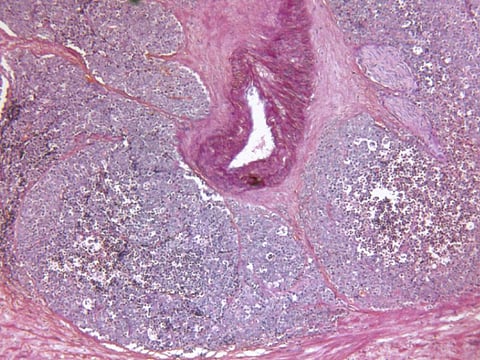MONDAY, June 5, 2017 (HealthDay News) -- In men with advanced prostate cancer, abiraterone (Zytiga) lowers risk of death by nearly 40 percent when added to standard androgen deprivation therapy, according to two studies published online June 4 in the New England Journal of Medicine. The research was published to coincide with the annual meeting of the American Society of Clinical Oncology, held from June 2 to 6 in Chicago.
The first clinical trial (LATITUDE) involved 1,199 men with newly diagnosed, high-risk prostate cancer. The patients were randomly assigned to receive either abiraterone plus prednisone or placebo, alongside standard androgen-deprivation therapy (ADT). After a median follow-up of 30.4 months, the median overall survival was significantly longer in the abiraterone group than in the placebo group (hazard ratio for death, 0.62). Risk of cancer progression was also lower in the abiraterone group compared to placebo (hazard ratio for disease progression or death, 0.47). The median length of radiographic progression-free survival was 33.0 months with abiraterone and 14.8 months for placebo.
The second clinical trial (STAMPEDE) involved 1,917 men with advanced prostate cancer who were starting ADT. Participants were randomized to ADT alone or ADT plus abiraterone acetate (1,000 mg daily) and prednisolone (5 mg daily) (combination therapy). At median follow-up of 40 months, there were fewer deaths in the combination group versus the ADT-alone group (hazard ratio, 0.63); the hazard ratio was 0.75 in patients with nonmetastatic disease and 0.61 in those with metastatic disease. There were fewer treatment-failure events in the combination group versus the ADT-alone group (hazard ratio, 0.29); the hazard ratio was 0.21 in patients with nonmetastatic disease and 0.31 in those with metastatic disease.
Both studies reported side effects noted with use of abiraterone as similar to those already found in patients taking the U.S. Food and Drug Administration-approved drug, the researchers said. Hypertension occurred in 20.3 percent of patients treated with abiraterone, compared to 10.0 percent of placebo patients, in the LATITUDE trial. Other severe side effects included hypokalemia (10.4 versus 1.3 percent) and liver enzyme abnormalities (5.5 versus 1.3 percent).
Both clinical trials received support from abiraterone's manufacturer, Janssen Biotech.
Abstract 1
Full Text
Abstract 2
Full Text
Press Release 1
Press Release 2
More Information


